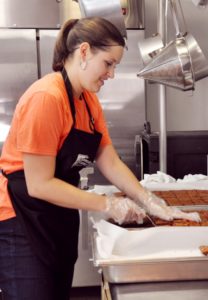On every other Thursday afternoon in November, you can hear pots and pans clanging from the Five N Two Food Pantry’s kitchen as you make your way through the parking lot filled with cars sporting Campbell University decals. The noises aren’t new to the pantry, as it used to operate a grill until earlier this year, but the college students in hairnets and matching “CKCU” t-shirts are.
The Campus Kitchen at Campbell University, or CKCU, is the 56th school to join the Campus Kitchens Project’s national network of kitchens that are empowering students to fight hunger and curb food waste.
It is a simple concept: reclaim unused food from local campus vendors and transform it into a healthy meal for those experiencing food insecurity. Unused food is food that is approaching its expiration date, which makes it unusable for on-campus dining services; produce from local grocery stores that may be undesirable in color or have blemishes; and leftover food not sold at farms or farmer’s markets.
The idea to start the program came from a student leadership team with the Spiritual Life office that formed after a visit to the D.C. Kitchen in spring 2015. The team jumped right in and secured a $5,000 grant from the national Campus Kitchens office to kickstart the Campus Kitchen at Campbell University.
The national Campus Kitchen grant added to funds from Voices Into Action, a local food access initiative, and the Ledford Missions Grant funded by an endowment at Hayes Barton Baptist Church, in Raleigh, North Carolina, allowed the Campus Kitchen at Campbell University to get right to work serving the food insecure of Harnett County.
“The providence of God”
While most campus kitchens at other institutions operate out of a commercial kitchen on a campus, the Campus Kitchen at Campbell University found space 30 minutes from campus that fits its mission.
“One of the initial struggles was finding a place that would allow us to serve,” said Faithe Beam, dean of spiritual life and campus minister. “It wasn’t until the summer of this year that we met Linda Yow at Five N Two Pantry, and they gave us this space to use. It is truly the providence of God.”
 The initial conversation, Beam said, was not about the Campus Kitchen but about getting Campbell students involved in their ministry in general. When Beam brought up the kitchen, Yow mentioned the recent closing of the Five N Two Grill and offered the space to use rent free. This space came with a fully equipped industrial kitchen and prep stations.
The initial conversation, Beam said, was not about the Campus Kitchen but about getting Campbell students involved in their ministry in general. When Beam brought up the kitchen, Yow mentioned the recent closing of the Five N Two Grill and offered the space to use rent free. This space came with a fully equipped industrial kitchen and prep stations.
The Five N Two Grill gives the Campus Kitchen team a clean slate to build systems that work for student teams versus working around a kitchen on campus used daily by others.
That — coupled with resources like industrial ovens, refrigerators, and catering trays — allow CKCU leaders to be intentional and thoughtful with their annual budget. Creating and managing a budget is something that sets the Campus Kitchen apart from a one-time service opportunity. The use of the Five N Two Grill frees up money in the budget to provide more meals and extend communication efforts for future events.
A gateway to community engagement
With three planned events this semester, the Campus Kitchen team is learning how to serve the residents of Harnett County by working with local schools and heeding advice from the national Campus Kitchen office. Matt Schnarr, the Campus Kitchens Project’s expansion and partnerships manager, visited campus for the official launch in early November.
“People often ask what makes a good campus kitchen. Is it a big school? A small school? Urban area? Or rural?” Schnarr. said “It really is inconclusive in terms of those metrics. Instead, it’s about how much support you have on campus. Campbell has that.
“Campbell has support from students who have taken on a lot of responsibility right away, administrators, and campus ministry.”
The Campbell team sees the kitchen as being a gateway to community engagement. It will be an opportunity for other divisions of Campbell to plug into the Harnett County community. Currently, the group is looking into offering outreach programs through athletics, providing nutrition classes along with meals, and potentially offering financial workshops through the Lundy-Fetterman School of Business for families who attend a Campus Kitchen event.
“We hope that the kitchen is not just one small service opportunity, but that it is a collaborative effort across the university,” Beam said.
Beginning in January, the Campus Kitchen will serve meals every other Thursday night at Highland Middle School in Sanford.



